Center Founder Richard Davidson speaks with the Upaya Zen Center on a variety of topics, including resilience, innate kindness, contemplative training and neuroplasticity.
Transcript
Welcome to Dharma Podcast at DharmaPodcast.org. This is Upaya Conversations, a monthly podcast series with our host Joanna Harcourt-Smith. Today’s guest is Richard Davidson, and this is episode 802 titled “Innate Kindness.”
Harcourt-Smith: “Hi,” my friends. It’s a beautiful morning here in Santa Fe, and I’m sitting with Richard Davidson, and it’s a privilege. We are at Upaya Zen Center. Richard Davidson received his Ph.D. in personality, psychopathology and psychophysiology from Harvard University. Would you like to say a few things about yourself?
Davidson: Well I’m a psychologist and neuroscientist by training, and I’m interested in differences among people in how they respond to life’s slings and arrows, to adversity, and how we can cultivate well-being, how we can cultivate resilience, help people to navigate the stresses and challenges of life with more equanimity with more grace and compassion for themselves and for others. We’re interested in the brain mechanisms that are associated with all of this and how those changes in the brain may affect the body in ways which are important for physical health as well.
Harcourt-Smith: So we are here, and you are a part of the faculty teaching a session called “Zen and the Brain,” and particularly research on consciousness. So I wanted to ask you, how does researching consciousness affect our possibility for compassion?
Davidson: Well it’s a very important question. I think that one component of compassion is understanding, having a clearer sense of the true nature of our minds and of reality. This is where the study of consciousness and the experience of consciousness, the basic experience of the fundamental nature of awareness, is something that I think that can be of great benefit because when we can see our consciousness in this way, what we appreciate is that all people have a disposition to be happy and to decrease suffering and to enjoy well-being. And when we see this, it provides the seeds for the expression of compassion because every human being has the same basic innate instincts, and that helps us to take the perspective of others and it helps us to understand that others have the same wish that we do, so we can act in ways that perhaps can be more helpful in promoting well-being in other people.
And one of the things that His Holiness the Dalai Lama says is that the best way to cultivate happiness for oneself is to be kind towards others, and it turns out that the hard-nosed research actually supports that. That the most expedient way of generating happiness and producing changes in the brain in circuits that we know to be involved in happiness is in fact to be generous and kind towards others. And so, I think that there is an important grain of truth here. And also this knowledge helps us to orientate ourselves in another way to do everything we can to benefit others because through that we are also benefitting ourselves.
Harcourt-Smith: So kindness is an enhancer of neuroplasticity perhaps? One can change one’s way by being kind?
Davidson I think in certain ways you can say that kindness is an enhancer of neuroplasticity. Kindness also takes advantage of neuroplasticity. Neuroplasticity in and of itself is not positive or negative; it’s not good or bad. It depends on how we fill our mind. If we are exposed to negative influences, then the neuroplasticity that we have will result in the brain changing in ways that are deleterious, that are not healthy, whereas, if we fill our minds with wholesome thoughts and aspirations, then we can harness neuroplasticity for a positive purpose.
Harcourt-Smith: So what is the best age for the formation of the brain in a positive way?
Davidson: I would say from everything we know from a neuroscientific perspective, it’s very important to begin as early as possible. We know that the brain is more plastic earlier in life. That is why it’s easier for young children to learn a second language than it is for adults; it’s why it’s easier for young children to learn to play a musical instrument than it is for adults. Young children’s brains are inherently more malleable; they’re more flexible. Now that doesn’t mean that the brain of an adult isn’t capable of changing. It is fully capable of changing. Plasticity exists throughout life, but it is much more pronounced earlier in life. Some of the research we are doing now in our center is focused on very young children. We are working with preschool kids, four and five years of age, and we’ve developed a curriculum that we call the “Kindness Curriculum,” where we are attempting to teach them simple skills of mindfulness and kindness very, very early in life because it’s our conjecture that if they’re taught these skills at that point, the possibility that they will really be very enduring is much greater. And our early findings are very suggestive and are very encouraging. We are now working with about 200 children in the public school system in Madison, Wisconsin, teaching these practices in a secular way, and if these initial findings are as encouraging as our first set of data, it would give us a lot of impetus to deploy this on a very large scale.
Harcourt-Smith: It’s beautiful. So kindness and compassion just as violence perhaps, can be learned behaviors, or can be learned behaviors. Do you think we can have a predisposition of these emotions at birth?
Davidson: Well those are an important set of questions. First I would say that it is very reasonable to think of kindness and compassion and happiness as skills. They are skills that can be enhanced through training. Having said that, there is an increasing range of hard-nosed scientific research that clearly indicates that we are born with an innate bias, an innate propensity for kindness. There’s no question about that. Very young infants of six months of age prefer to watch interactions that are kind interactions – cooperative, helping. They prefer that over interactions that are aggressive and antagonistic encounters. That preference is clear from very, very early on in life.
Now it’s also true that some individuals are likely to have this propensity more expressed compared to other people. And that’s just the nature of human variation. But I believe that each human being, unless they are grossly brain-damaged, has the innate capacity, the innate seeds of kindness and compassion. And just like language – we all have the capacity for language, we are all born with an innate capacity for language, but the expression for language requires that we be raised in a linguistic community. And similarly for kindness and compassion, we are all born with these seeds, but it requires that they be nurtured, and if they’re not nurtured, they will atrophy. And so one of the roles of contemporary training is to nourish these seeds so that they do blossom and flourish, and there is scientific evidence to suggest that it is possible.
Harcourt-Smith: I understand that you just returned from India, and I was wondering if you wanted to talk about your journey for a little bit.
Davidson: Well very briefly, I was in India primarily to participate in a meeting with His Holiness the Dalai Lama in the Drepung Monastery in the south of India in Mungad. And the meeting was a historic occasion because this was the first time scientists were ever brought to a Tibetan monastery, and the audience was 10,000 monks. And this was a huge act of courage on the part of His Holiness to invite us, but he very much wanted his monastic community and the abbots of these monasteries to see it first hand, what this dialogue with scientists was all about. And for His Holiness, I think that this was a huge milestone, and it was also an occasion to celebrate the first change in the monastic curriculum, in the Gyuto monastery in 400 years, which is the formal introduction to modern science. So it was quite an event, and I believe that the ripples from this will be felt for many years to come.
Harcourt-Smith: Let’s talk a little bit more about emotion and the brain. Will you speak about your latest work with emotions?
Davidson: Well I wrote a recent book called The Emotional Life of Your Brain, and that book describes 30 years of research that we’ve done in my laboratory that’s primarily focused on variations among people in how they respond to emotional challenges. And it starts with the premise that there is huge variation among people in how they respond to the stresses and strains of everyday life. What I do in the book is characterize six different styles that are biased upon neuroscientific research; they are different ways in which we vary in how we respond to emotional challenges.
So I’ll give one example. One style we call the resilience style, and it reflects the rapidity with which you recover from adversity. So some people after a stressful challenge will have these negative emotions persist for a long period of time, other people come back down to baseline quickly, and coming back down to baseline quickly is a mark of resilience. And people vary where they fall along that continuum, and the good news is that we know something about the brain circuits that mediate this and these brain circuits exhibit plasticity and they can change – and through certain kinds of training. We’ve found in recent work that certain kind of meditation training, particularly compassion practices, will alter the neural response that underlies this style of resilience and will lead to rapid recovery following a stressful challenge.
Harcourt-Smith: So we are going to close this moment with you, and I just want to ask you: What would you like to say in closing?
Davidson: Well we are at a very critical moment in history. There are both hopeful signs as well as distressing signs on the planet. The way we have failed to be mindful to our environment and the issues relating to climate change are quite significant. The economic crisis that the world is in as a consequence of, I think, primarily greed, has made for very difficult challenges. On the other hand, I think that there is a recognition among very large segments of the population that there are better ways of conducting ourselves, and the scientific research that we’ve been doing can play a small role in helping to catalyze change, in helping to show that things the way they are, are not inevitable…. that we can actually take more responsibility of our own minds and transform our minds in ways that will promote increased cooperation, kindness, and increased well being, and also a greater sensitivity to the environment around us so that we can be better caretakers of the planet. So I think that this is a hopeful sign amid other distressing characteristics, but one that gives me confidence that there is a very bright future for humanity.
Harcourt-Smith: Thank you so much for your presence.
Davidson: Thank you. Pleasure to do this.






